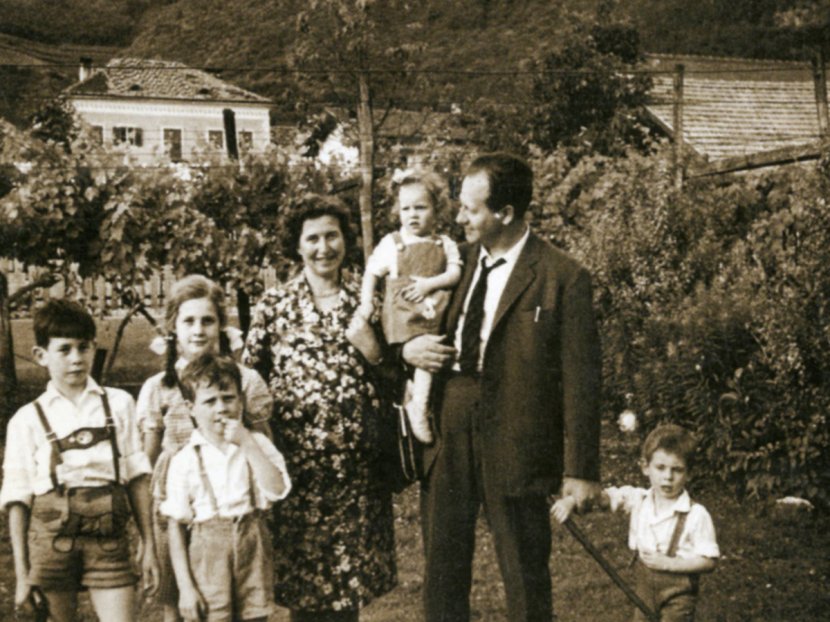Then and now: The South Tyrolean autonomy – a family affair as well
The Holzner has been a place of living history for 112 years. And through all the ups and downs, through all the periods of prosperity and crises, it has grown and become what makes it lovable and special today: a place of joy and peace for all generations, then and now. This time, you will read about how South Tyrol has fought for its autonomy over decades and how our grandfather had a hand in this.

When in 1948, the first Statute of Autonomy was approved, it became clear that the South Tyroleans would have to keep doing without self-government: The two provinces of Bolzano and Trento had unceremoniously been merged to form the Trentino-Alto Adige Region with a joint regional government. Local autonomy was therefore in the hands of the Italian majority in Trentino. It was not until 1955 when Austria regained its full capacity for action in foreign policy, and thus, could increase pressure on the Italian government to press ahead with the implementation of the Paris Treaty. In 1960, after fruitless talks with the Italian authorities, the Austrian Foreign Minister Bruno Kreisky put the South Tyrol problem on the agenda of the 15th UN General Assembly. But it would take another 12 years until the second Statute of Autonomy came into effect.
Meanwhile, in South Tyrol, the mood was fluctuating between resignation and agitation when Hans Dietl, an SVP (South Tyrolean People's Party) politician, withdrew from the regional government in 1956, thus sending a signal of rebellion. Isolated in his party as a "radical", one day there was a knock at his door. In front of it stood the young orchard grower Franz Widmann from Bolzano with his wife Pia, the parents of Marianne, grandparents of Wolfgang Holzner.
Franz Widmann and Hans Dietl became allies and close friends. They would also become the masterminds behind the upheaval that was to take place in South Tyrol. Secret meetings with like-minded people, and months of travel through South Tyrol followed. The aim was to remove the old guard of the party leadership, which in the eyes of Widmann, Dietl and many others had been too tame, and replace them with younger, more courageous candidates in the upcoming election of the SVP leadership. The coup succeeded, all the candidates favored by Widmann and Dietl took over the party leadership, and Silvius Magnago became chairman of the SVP as planned.
In 1957, plans of the Italian government to settle more than 5.000 Italian workers in Bolzano were made public, and German-speaking South Tyroleans feared the increasing marginalization of the local population. As a result, the South Tyrolean People's Party gathered 35,000 people at the Sigmundskron mass rally and demanded a separation of the Province of Bolzano from the Province of Trento, thus arousing international interest in the South Tyrolean question for the first time.
At this point, the pressure on the Italian government was increasing visibly, on the one hand by the Austrian government, on the other hand by the UN General Assembly, both of which were demanding that the Italians would implement the Paris Treaty. The bomb attacks carried out by the BAS, the Liberation Committee South Tyrol, which were primarily aimed at damaging state property such as power poles, were intensifying the conflict and further fueling diplomatic negotiations. Because of his involvement in underground activities, Franz Widmann often slept fully clothed at this time, with his travel documents at hand, in case the police and secret service would get onto him and storm the Widmanns' home. Thanks to Franz's work in the background as a simple party functionary, the family was spared, thank God.
From 1961 onwards, various commissions were working out measures for the implementation of the Paris Treaty, which were finally approved by all the interest groups involved in 1969 as the so-called “South Tyrol Package”. After the general assembly of his party to conclude the Package negotiations, Franz Widmann withdrew from politics. In 1972, the Second Statute of Autonomy for South Tyrol came into effect, which enables extensive self-administration of public life in South Tyrol to this day.
In the following decades, our grandfather dedicated himself to create a monumental piece of work about the history of South Tyrol between 1945 and 1972, which was published in 1998. He lived happily and contentedly with his Pia, first in Bolzano, then not far from Holzner in Oberbozen, where he watched his large family grow and, to the delight of his 31 grandchildren and ten great-grandchildren, was able to wiggle his ears and tell of the eventful times he had played a decisive role in. At the proud age of 91, he died at home in 2012, surrounded by his loved ones.